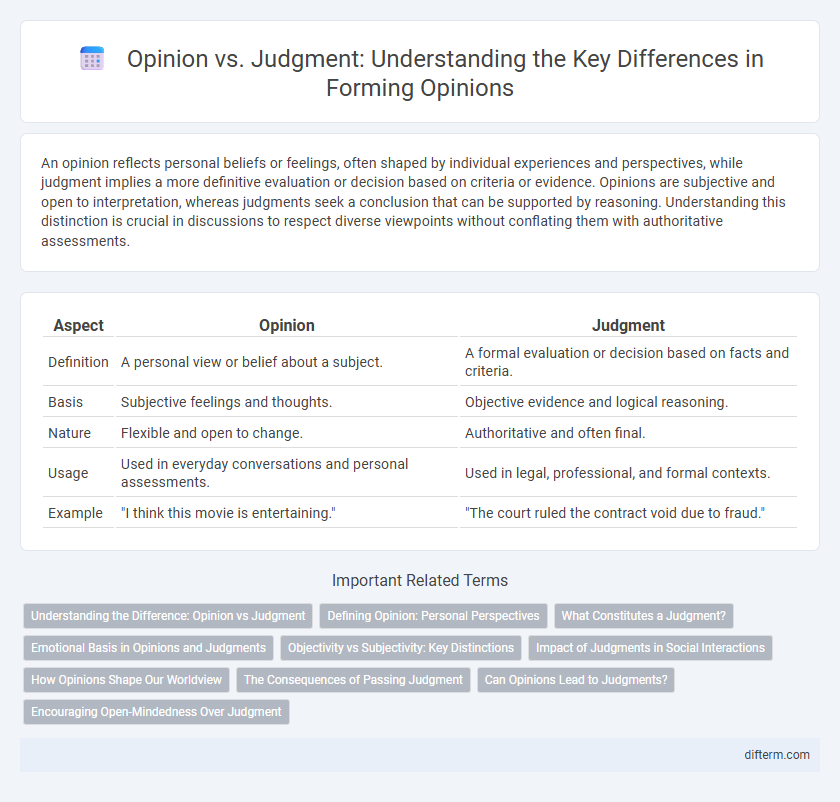An opinion reflects personal beliefs or feelings, often shaped by individual experiences and perspectives, while judgment implies a more definitive evaluation or decision based on criteria or evidence. Opinions are subjective and open to interpretation, whereas judgments seek a conclusion that can be supported by reasoning. Understanding this distinction is crucial in discussions to respect diverse viewpoints without conflating them with authoritative assessments.
Table of Comparison
| Aspect | Opinion | Judgment |
|---|---|---|
| Definition | A personal view or belief about a subject. | A formal evaluation or decision based on facts and criteria. |
| Basis | Subjective feelings and thoughts. | Objective evidence and logical reasoning. |
| Nature | Flexible and open to change. | Authoritative and often final. |
| Usage | Used in everyday conversations and personal assessments. | Used in legal, professional, and formal contexts. |
| Example | "I think this movie is entertaining." | "The court ruled the contract void due to fraud." |
Understanding the Difference: Opinion vs Judgment
Opinion reflects a personal belief or preference shaped by individual experiences and emotions, often subjective and flexible. Judgment involves a more deliberate evaluation based on facts, evidence, and rational analysis, leading to a conclusion or decision. Recognizing the distinction between opinion and judgment enhances critical thinking and effective communication in both personal and professional contexts.
Defining Opinion: Personal Perspectives
An opinion represents an individual's personal perspective shaped by their experiences, emotions, and beliefs, distinct from judgment, which involves forming a formal evaluation or conclusion based on evidence. Opinions are subjective and vary widely among people, reflecting diverse viewpoints rather than objective truths. Understanding this distinction highlights the importance of respecting personal perspectives while recognizing the critical assessment involved in judgment.
What Constitutes a Judgment?
A judgment constitutes a reasoned evaluation based on evidence, while an opinion often reflects personal beliefs or preferences without requiring factual support. Judgments involve critical analysis and objective criteria to reach a conclusion, distinguishing them from subjective opinions. Understanding the distinction between judgment and opinion enables clearer communication and more effective decision-making.
Emotional Basis in Opinions and Judgments
Opinions often stem from personal emotions and subjective experiences, shaping how individuals perceive situations based on feelings rather than objective facts. Judgments incorporate a more analytical approach, weighing evidence and logical reasoning alongside emotional insights to reach conclusions. Understanding the emotional basis behind opinions highlights the influence of individual biases, while judgments strive for balanced evaluations despite emotional undercurrents.
Objectivity vs Subjectivity: Key Distinctions
Opinion reflects subjective perspectives shaped by personal feelings, beliefs, and experiences, while judgment strives for objectivity by evaluating facts and evidence impartially. Subjectivity in opinions allows for diverse interpretations, whereas judgments require detachment to ensure fairness and consistency. Understanding this distinction is crucial in fields like law, science, and ethics where unbiased decisions are essential.
Impact of Judgments in Social Interactions
Judgments often shape social dynamics by creating biases that influence how individuals perceive and treat others, potentially leading to misunderstandings or conflicts. Unlike opinions, which reflect personal beliefs and can be flexible, judgments tend to be definitive assessments that affect trust and cooperation within groups. The impact of judgments in social interactions frequently results in either social inclusion or exclusion, affecting emotional well-being and community cohesion.
How Opinions Shape Our Worldview
Opinions influence perception by filtering experiences through personal beliefs, shaping how individuals interpret information and interact with their environment. Unlike judgments, which often seek definitive conclusions, opinions remain fluid and adaptive, allowing for the evolution of thought. This dynamic interplay between opinion formation and worldview construction underpins social discourse and cultural development.
The Consequences of Passing Judgment
Passing judgment often leads to misunderstandings and damaged relationships because it imposes a fixed viewpoint without considering context or intent. Opinions allow for open dialogue and personal interpretation, fostering empathy and growth, whereas judgments tend to create division and resistance. The consequences of harsh judgment can include social isolation, decreased trust, and emotional distress for both the judged and the judge.
Can Opinions Lead to Judgments?
Opinions, shaped by personal beliefs and experiences, often serve as the foundation for judgments but do not necessarily dictate them. Judgments require a more deliberate evaluation process, incorporating evidence and reasoning beyond subjective opinions. While opinions can influence judgments, critical thinking and objective analysis are essential to ensure that judgments are fair and well-founded.
Encouraging Open-Mindedness Over Judgment
Encouraging open-mindedness cultivates empathy and fosters constructive dialogue by prioritizing understanding over immediate judgment. Opinions thrive in an environment where diverse perspectives are explored without bias, enabling personal growth and collective insight. Embracing open-mindedness challenges assumptions and reduces conflicts rooted in premature or rigid judgments.
opinion vs judgment Infographic

 difterm.com
difterm.com